Characteristics
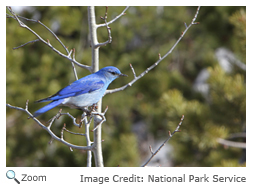 The mountain bluebird is six to seven inches in length. It has a small, pointed black bill and black legs and feet. The mountain bluebird is six to seven inches in length. It has a small, pointed black bill and black legs and feet.
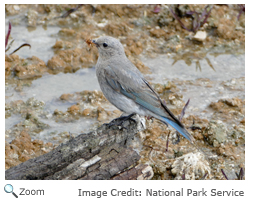 The male is a deep sky blue above and a paler blue below with a white stomach. The male is a deep sky blue above and a paler blue below with a white stomach.
The female is a duller blue-gray on her wings and has a gray throat, back, and crown.
Range
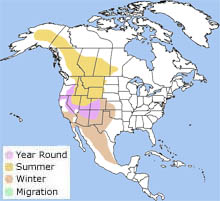 The mountain bluebird breeds from east-central Alaska, southern Yukon and western Manitoba south in the mountains to southern California, central and southeastern Nevada, northern and east-central Arizona, southern New Mexico and east to northeastern North Dakota, western South Dakota and central Oklahoma. It winters from Oregon south to Baja California, Mexico and southern Texas, and east to eastern Kansas, western Oklahoma and central Texas. The mountain bluebird breeds from east-central Alaska, southern Yukon and western Manitoba south in the mountains to southern California, central and southeastern Nevada, northern and east-central Arizona, southern New Mexico and east to northeastern North Dakota, western South Dakota and central Oklahoma. It winters from Oregon south to Baja California, Mexico and southern Texas, and east to eastern Kansas, western Oklahoma and central Texas.
Habitat
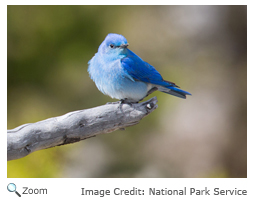 The mountain bluebird breeds in high mountain meadows with scattered trees and bushes and short grass. It winters at lower elevations in plains and grasslands. The mountain bluebird breeds in high mountain meadows with scattered trees and bushes and short grass. It winters at lower elevations in plains and grasslands.
|
|
Diet
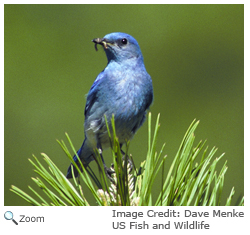 The mountain bluebird hovers just above the ground looking for insects. When it spots one, it swoops down and snatches it up. It may also swoop down on its prey from a perch in a tree. In the winter mountain bluebirds travel in small flocks, sometimes with sparrows and western bluebirds, and forage for insects and berries. The mountain bluebird hovers just above the ground looking for insects. When it spots one, it swoops down and snatches it up. It may also swoop down on its prey from a perch in a tree. In the winter mountain bluebirds travel in small flocks, sometimes with sparrows and western bluebirds, and forage for insects and berries.
Life Cycle
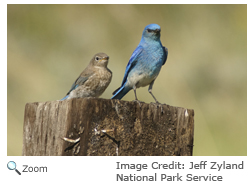 The males usually arrive at the breeding site first. They select a nesting site in a tree cavity, an old woodpecker hole or in a rocky crevice. When the females arrive, the males fly in and out of their sites and call out, trying to attract the interest of a female. The males usually arrive at the breeding site first. They select a nesting site in a tree cavity, an old woodpecker hole or in a rocky crevice. When the females arrive, the males fly in and out of their sites and call out, trying to attract the interest of a female.
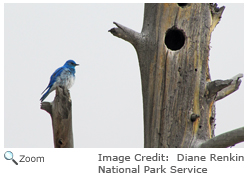 Once a pair has mated, the female will build a nest of plant fibers and bark while the male guards her and the nesting site. The female lays four to seven eggs at a rate of one egg per day. The female incubates the eggs. The chicks hatch after about 13 days. The male brings food to the female and the chicks. The chicks fledge when they are 22-23 days old, but may stay with their parents for another two months. Sometimes a pair will have a second brood during the breeding season. Once a pair has mated, the female will build a nest of plant fibers and bark while the male guards her and the nesting site. The female lays four to seven eggs at a rate of one egg per day. The female incubates the eggs. The chicks hatch after about 13 days. The male brings food to the female and the chicks. The chicks fledge when they are 22-23 days old, but may stay with their parents for another two months. Sometimes a pair will have a second brood during the breeding season.
Behavior
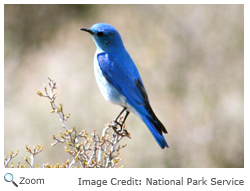 Sometimes the mountain bluebird migrates alone, but it usually travels in flocks of up to 50 birds. They migrate slowly, stopping often to feed. Sometimes the mountain bluebird migrates alone, but it usually travels in flocks of up to 50 birds. They migrate slowly, stopping often to feed.
|